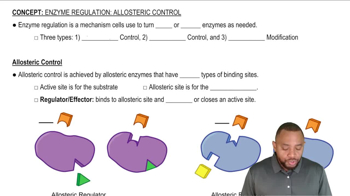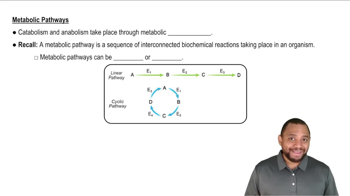Glycolysis of one molecule of glucose produces 8 ATP molecules. How many ATP molecules are produced from glycolysis of 10 glucose molecules?
Ch.22 Carbohydrate Metabolism
Chapter 22, Problem 22.23
Glucose 6-phosphate is in a pivotal position in metabolism. Depending on conditions, glucose 6-phosphate follows one of several pathways. Under what conditions do the following occur?
d. Glycogenesis
 Verified step by step guidance
Verified step by step guidance1
Identify the role of glucose 6-phosphate in metabolism. It is a key intermediate that can be directed into various metabolic pathways depending on the body's needs.
Understand glycogenesis: It is the process of converting glucose into glycogen for storage, primarily in the liver and muscle cells.
Recognize the conditions that favor glycogenesis: This process occurs when there is an excess of glucose in the blood, typically after a meal when blood glucose levels are high.
Consider the hormonal regulation: Insulin, a hormone released by the pancreas in response to high blood glucose levels, promotes glycogenesis by activating enzymes involved in the conversion of glucose 6-phosphate to glycogen.
Summarize: Glycogenesis occurs under conditions of high blood glucose and insulin presence, facilitating the storage of glucose as glycogen for future energy needs.

Verified Solution
Video duration:
6mWas this helpful?
Key Concepts
Here are the essential concepts you must grasp in order to answer the question correctly.
Glycogenesis
Glycogenesis is the biochemical process of converting glucose into glycogen for storage, primarily in the liver and muscle tissues. This process occurs when there is an excess of glucose in the bloodstream, typically after meals, when insulin levels are elevated. Insulin promotes the activity of enzymes involved in glycogenesis, facilitating the conversion of glucose 6-phosphate into glycogen.
Insulin Regulation
Insulin is a hormone produced by the pancreas that plays a crucial role in regulating blood glucose levels. When blood glucose levels rise, insulin is secreted, signaling cells to uptake glucose and promoting glycogenesis. This regulatory mechanism ensures that excess glucose is stored as glycogen, preventing hyperglycemia and maintaining energy balance in the body.
Recommended video:
Guided course

Allosteric Control Concept 1
Metabolic Pathways
Metabolic pathways are series of chemical reactions occurring within a cell that lead to the conversion of substrates into products. In the context of glucose 6-phosphate, it can enter various pathways such as glycolysis, gluconeogenesis, or glycogenesis, depending on the body's energy needs and hormonal signals. Understanding these pathways is essential for comprehending how glucose is utilized or stored in response to different physiological conditions.
Recommended video:
Guided course

Metabolic Pathways Concept 2
Related Practice
Textbook Question
18
views
Textbook Question
What two types of reactions convert glycerol to dihydroxyacetone phosphate? <IMAGE>
32
views
Textbook Question
What is the purpose of the Cori cycle?
24
views
Textbook Question
Glucose 6-phosphate is in a pivotal position in metabolism. Depending on conditions, glucose 6-phosphate follows one of several pathways. Under what conditions do the following occur?
b. Hydrolysis to free glucose
22
views
Textbook Question
Outline the conditions that direct pyruvate toward the following:
d. Glucose synthesis (gluconeogenesis)
In what tissues or organisms is each pathway present?
28
views
Textbook Question
Name the molecules used for gluconeogenesis. What are the sources of these molecules? Under what conditions would gluconeogenesis occur?
29
views
